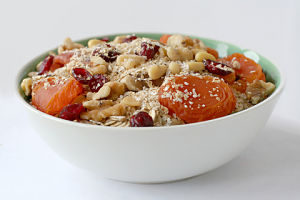Posts Tagged ‘whole foods’
Saturday, June 19th, 2010
Killer Reasons to Break Up with Your Grill This Summer
The start of warm summer breezes and promise of the Fourth of July inspire many to drag out their barbecue grill. Charcoal and lighter

Barbeques deliver a double dose of dangerous chemicals. These hazards get into your body through your lungs and your digestive tract.
fluid join the bestseller list. Outdoor cooking sets the stage for traditional get-togethers with family and friends.
This romance with barbecues has a dark side that few know about. After all, information about polycyclic aromatic hydrocarbons (PAH) is obscured by millions of dollars of ads and happy images for grilled meat.
As is the case for most toxic chemicals, the long-term health effects of PAH are poorly understood, so easy to ignore. Yet PAH is an insidious public health nightmare that can invade your own life and the next generation.
Truth in labeling would require an explicit warning on bags of charcoal and packs of meat and fish. “Eating grilled or smoked animal foods can cause DNA mutation, cancer, and lower intelligence in your children.” Wide knowledge of these dangers might inspire many to consider alternatives, or at least make informed decisions.
Polycyclic aromatic hydrocarbons are a product of incomplete combustion of materials that contain carbon. Burn tobacco, wood, oil, gasoline, coal, garbage – or meat and fish – and PAHs will form. Over 100 varieties of PAHs can menace our health and the environment.
A widespread nutrition myth touts that the major harm from (more…)
Tags: barbecue, charcoal, environmental degradation, family, getting healthy, HCA, heterocyclic amines, in utero, Janice Stanger, making a difference now, nutrition facts, PAH, Plant-based nutrition, polycyclic aromatic hydrocarbons, whole foods
Posted in Health | Comments Off on Barbecue with a Side of Chemicals
Saturday, June 12th, 2010
Michele DeFilippo Finds Vitality and Diet Can’t be Separated
As the owner of 1106 Design, and an active player in the creation of book covers, interiors, and business logos, Michele DeFilippo

The creative tasks at 1106 Design demand Michele's full energy
draws on physical and mental energy through long days and tight timelines. I met Michele when, impressed by 1106’s strong portfolio, I worked with her and her team on the cover and interior for The Perfect Formula Diet.
Several months later, Michele shared with me that she had decided to try the Perfect Formula Diet eating plan. This diet, based on whole plant foods, includes vegetables, fruit, beans, potatoes, whole grains, herbs, spices, nuts, and seeds. There are no artificial portion sizes. Instead, the diet balances the proportions of the different food types so you can eat whenever you are hungry and stop when you are full. The benefits for both health and permanent weight loss are impressive.
Here is Michele’s account of her experience with the Perfect Formula Diet.
Janice: What kinds of foods did you grow up eating?
Michele: I’m of Italian descent, so our diet was typically (more…)
Tags: 1106 Design, energy, fatigue, getting healthy, inflammation, lose weight, Michele DeFilippo, nutrition facts, Plant-based nutrition, vitality, weight loss, whole foods
Posted in Health | Comments Off on Energy to the Max with Whole Foods
Monday, May 31st, 2010
Whip Up Health and Weight Loss Success in Minutes
Imagine if someone actually paid you to be healthy. Sent you a handful of dollar bills every morning to have fun. That’s what cooking

Even a child can cook simple foods. In fact, food prep can be a fun family experience.
your own food is like.
Compared to eating out, cooking whole foods at home saves so much money that you can bank the difference. And even if you dread the task of preparing food now, a few simple insights and strategies can make the kitchen a favorite room.
In this era of manufactured, salt-drenched offerings in restaurants and supermarkets, cooking is a survival skill. If you flinch from preparing food, your health and weight will suffer.
Cooking is a major survival skill in the modern world. So you may as well learn to enjoy it. Here are twelve tips to get started on preparing your own home-cooked meals using (more…)
Tags: cooking, family, getting healthy, Janice Stanger, lose weight, Plant-based nutrition, Recipes, weight loss, whole foods
Posted in Plant-based nutrition | Comments Off on Twelve Ways to Make Cooking Fun and Easy
Sunday, May 23rd, 2010
Each Player on Its Own Can Do Little
No matter how well you eat, you may worry about your diet. You may doubt you are getting enough of certain nutrients. Iron, zinc,

With a superstar team, all players work together to win. Similarly, for whole foods, the benefit of all nutrients together is more than each taken on its own.
calcium, protein, omega-3 fatty acids…concern about these may hinder enjoyment of your food. Or maybe you are reluctant to begin a plant-based diet, because you are not sure if some critical nutrient is lacking.
We do not benefit from dissecting our foods into proteins, fats, carbs, calcium, iron, individual vitamins, and other components. The modern practice of taking food apart and worrying about each piece separately has led to bizarre eating patterns.
You may fret about lacking protein, or eating too many “carbs,” or not having enough “good fats.” So instead of eating whole foods, you then choose protein powder, neatly wrapped food bars, or bottles of oil. These foods narrowly focus on one or a few nutrients, leaving out most of the goodness of the entire plant.
Think of these manufactured foods as similar to a demolished building. You can live in an intact house, but won’t find shelter in a pile of bricks. Similarly, you won’t find the nutrients you need in (more…)
Tags: getting healthy, Janice Stanger, nutrition facts, Perfect Formula Diet, phytochemicals, Plant-based nutrition, vegetables, weight loss, whole foods
Posted in Plant-based nutrition | 1 Comment »
Friday, May 14th, 2010
A Whole Foods Diet Does Not Have to Be Bound to a Clock
Meal plans are a hallmark of most diets. You are expected to get hungry on cue, and wait until a specific time to eat again. If you

Soup is ideal for not-meals. You can eat a cup or a bowl, depending on how hungry you are.
are famished between meals, you might be allowed a small snack – probably not enough food to satisfy.
Meals are a human invention. These prescribed times to eat serve to carve up the day, leaving long stretches to be devoted to work. Everyone gets synchronized on pretty much the same rhythm. This may be good for societal functioning, but is not so good for your body.
Hunger is a fundamental instinct and need. Your ancestors, foraging in nature, undoubtedly ate when they were hungry and food was available. Wild animals, living as nature intended, will eat off and on the entire time they are awake.
Your naturally perfect body knows when you need fuel and nutrients. Our understanding of nutrition and physiological
functioning is still far from complete. To second guess your body’s signals to eat is a recipe for failure in the long-run, and often even in the short-run.
The Perfect Formula Diet eating plan urges you to eat when you are moderately hungry and stop when you are full. If you wait until you are famished to eat, you are far more likely to let your appetite get out of control. The end result is that you stuff yourself with too much (more…)
Tags: Janice Stanger, lose weight, not-meals, Perfect Formula Diet, Plant-based nutrition, vegetables, weight loss, whole foods
Posted in weight loss | 1 Comment »
Saturday, May 1st, 2010
Sodium Demonstrates That More is Not Always Better
In April, an Institute of Medicine (IOM) report once again highlighted the health consequences of eating too much salt. The report’s recommendation that the FDA should regulate salt in restaurant and processed food is news. Repeating information that the sodium in salt worsens high blood pressure merely reinforced what the majority of people likely already had heard.
The most important lesson hidden in the IOM report is the message that, in achieving ideal nutrition, more is not always better.

You can grind gourmet or specialty salt, but these have just as much sodium as regular salt
You may not realize that you do need some sodium, an essential mineral, in your diet.
When dissolved in a fluid (as it is in your body), sodium becomes electrically charged and is called an electrolyte. Sodium is essential for muscle and nerve function. If you lose too much sodium (for example, through heavy sweating), you may experience weakness, nausea, vomiting, cramping, and seizures.
Barring major sodium loss, you don’t need to worry about getting enough of this mineral. In fact, although the USDA recommends maximum amounts of sodium to eat, they do not even bother to suggest a minimum amount. You will get all the sodium you need on just about any reasonable diet.
Your kidneys actively regulate the amount of sodium and other electrolytes in your blood. When you eat too much salt, you make your body’s task of regulating these substances way more difficult, and health consequences may be serious. Cells are damaged by either too much or too little sodium in the fluid surrounding them. We all understand and accept the fact that, for salt, more is not always better. But you might not know that this general principle applies to all nutrients. The fact is, your body is an exquisitely delicate and complex system designed to work within narrow limits. Your body wants to maintain (more…)
Tags: getting healthy, high blood pressure, Janice Stanger, nutrition facts, Plant-based nutrition, salt, sodium, vegetables, whole foods
Posted in Plant-based nutrition | Comments Off on Limiting Salt to Just the Right Amount
Saturday, April 24th, 2010
A Garden Boosts Both Nutrition and Health
June can’t arrive soon enough for me. I signed up for an introductory permaculture class held June 2nd and 5th at San Diego Botanic Garden in Encinitas. Permaculture is an approach to growing food that works with nature. Instead of attacking and attempting to overpower nature – always futile and destructive in the long run – permaculture works in harmony with natural law.

Sunflowers combine the cheerful beauty of flowers with a delicious crop
The result is food for people and habitat for birds and wildlife.
Permaculture seeks to connect people and nature in a seamless web. Horticulture therapy takes advantage of this principle as well, This therapy treats a variety of patients and ailments using gardens and gardening. The lush colors and textures of plants is a welcome respite from a sterile, institutional health care setting.
For example, hospitals may bring patients into the outdoors to tend plants as part of their rehabilitation program. Elderly nursing home residents gain strength planting, weeding, and cutting flowers. Mental health settings can incorporate gardening into group therapy. Even Alzheimers disease patients become less anxious and more focused when engaged with nature.
You don’t need to wait until you are a patient to take advantage of the healing power of gardening. Growing plants is therapeutic for many reasons. First, and most obvious, is the exercise. Gardening may involve walking, lifting, bending, stooping, digging, and other physical tasks. Even tasks that are not strenuous add up when you do them frequently or over a (more…)
Tags: getting healthy, horticulture therapy, Janice Stanger, permaculture, Plant-based nutrition, San Diego Botanical Gardens, vegetables, whole foods
Posted in Green spaces | 1 Comment »
Saturday, April 17th, 2010
Useful News from the Vital Signs Workshop
Five pioneering researchers with one critical message shared their knowledge at the Vital Signs workshop on April 10, 2010. This event, put together by the awesome nonprofit Physicians Committee for Responsible Medicine (PCRM) was packed with compelling new information in nutrition and health.

A food as simple and tasty as oatmeal with fruit, nuts, and dairy-free milk will set you strong on the road to health
Here are highlights of five useful tips from each of the five presenters. If you missed the workshop and want to learn more, PCRM has generously posted the slides.
Lawrence H. Kushi, Sc.D. summarized the findings of thousands of studies.
1. The American Cancer Society emphasizes whole plant foods (including five or more servings daily of fruits and vegetables), exercise, and a healthy weight to prevent cancer.
2. The World Cancer Research Fund/American Institute for Cancer Research report reinforces the importance of a varied whole foods, plant-based diet, physical activity, and lean weight in preventing and fighting cancer.
3. This report also recommends avoiding red meat, processed meat, alcohol, and salty foods.
4. Eating lots of fruits, vegetables, and whole grains helps prevent obesity and weight gain.
5. It’s silly to put meat and beans in the same food group. You are best off just eating the beans. We (more…)
Tags: Dr. Dean Ornish, Dr. John McDougall, Dr. Lawrence Kushi, Dr. Mark Messina, Dr. Neal Barnard, getting healthy, Janice Stanger, lose weight, nutrition facts, PCRM, Plant-based nutrition, process of change, vegetables, Vital Signs workshop, whole foods
Posted in Plant-based nutrition | 1 Comment »
Sunday, April 11th, 2010
Prevent Wrinkles with Whole Foods – And Protect Your Health in the Process
Your skin, your largest and heaviest organ, mirrors the health of your body. Your 20 pounds or more of skin protect you, regulate body temperature, make essential chemicals, and allow you to feel touch, temperature, and pressure.

Changes in skin with aging are normal. Premature wrinkles, though, can be a marker for a poor diet.
The complexity of your skin is dazzling and important to appreciate. In just one square inch of skin you have about 500 sweat glands, 1,000 nerve endings, yards of tiny blood vessels for nourishment, 100 oil glands, 150 pressure sensors, and millions of cells. This intricate structure is separated into an inner and outer layer of skin. Each layer, in turn, has its own distinct architecture of many additional layers.
The deeper skin layer has both tough and stretchy protein fibers. As you age, your skin becomes thinner and less elastic. The protein fibers have less ability to bind water to keep your skin plumped.
Wrinkles form. While these marks of long life can be beautiful, the larger concern is that premature skin aging signals poor eating habits that can impair longevity and enjoyment of life. A diet rich in whole plant foods shields your skin from damage that can lead to wrinkling. Here’s why.
Radiation from the sun or a tanning booth causes free radicals to form. These are electrically charged particles that can damage cells in your skin.
Note free radicals emerge as part of normal metabolism, so all your cells (skin included) are bombarded by these hazardous particles even without (more…)
Tags: antioxidants, free radicals, getting healthy, Janice Stanger, nutrition facts, Plant-based nutrition, skin, vegetables, whole foods, wrinkles
Posted in Plant-based nutrition | Comments Off on Eat More, Wrinkle Less
Friday, April 2nd, 2010
Enjoying Whole Foods on a Trip Does Not Have to be Difficult
While some people find travel to be the high point of the year, others loathe it as a necessary evil. Regardless of where you fall on this spectrum (I’m about in the middle), you may dread the hunt for healthy food when traveling. You may be tempted to just grab

You may be traveling far from home. You can do a lot better than the usual airline or airport food by bringing your own.
whatever is convenient, even if you are usually on a whole foods diet.
At home, you have all the advantages. You’ll probably get hungry at predictable times, and can stock your pantry and refrigerator in advance. You know where to shop to get the vegetables, fruits, beans, potatoes, and whole grains that are the foundation for satisfying whole foods throughout the day. You can cook in familiar surroundings with all the pots, pans, and kitchen knick knacks you want. Your favorite restaurants with the food choices you like are nearby.
You may think it’s not a problem to just eat whatever is handy when away from home. The thinking is that the trip is only temporary, so you will restart healthy eating when it’s convenient. The problems with this reasoning (more…)
Tags: getting healthy, global warming, Janice Stanger, making a difference now, Plant-based nutrition, reverse chronic disease, travel, vegetables, whole foods
Posted in Plant-based nutrition | 1 Comment »














